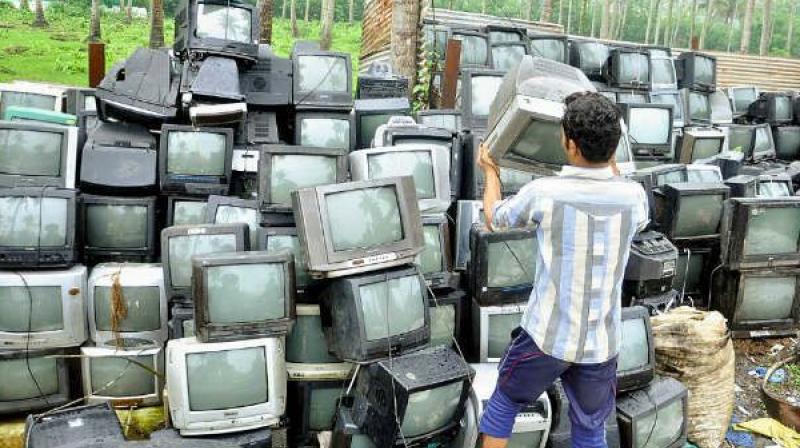Tamil Nadu: E-waste policy drafted in 2010 yet to be implemented

Chennai: Despite being an I-T hub and a big consumer of computers and laptops, Tamil Nadu lags behind other states in recycling its e-waste.
Seven years ago Tamil Nadu drafted Tamil Nadu e-waste policy 2010 but a very little has been done to execute the policy. About 26 units are into recycling business but there is no concrete data on the recycled e- waste, an informed state official said adding that Tamil Nadu was lagging behind Maharashtra and Karnataka due to lack of capacity building and training of workers engaged into e- waste.
An assessment made in Chennai city in 2004-05, on e-waste generated from personal computers, televisions and mobile phones revealed that during 2004-05 the city generated around 26,183 tonne of e-waste and in 2013-14 was around 1,40,000 tonne and now the waste could have surpassed 2 lakh tonne per year.
One of the objectives of the policy was to reduce e-waste and treat all e- waste generated by recycling. Both the objective are now becoming tough task due to growing use of cellphones and smart electronic equipment, the official who was part of the 2010 draft policy said.
“More than 70 per cent of e-waste is recycled in the informal sector and only about 30 per cent reach authorized recyclers. And because of this fact you can still find e-waste available at waste paper marts and old markets in Chennai,” said N Balaji, a software engineer based in Perumbakkam.
“E-waste is either processed by unauthorised recyclers (informal sector) or being resold without the knowledge of handling it and it is completely unsafe to handle e-waste that has been dumped after its utility period,” he said.
Admitting that a lot needs to be done, an official with Tamil Nadu Pollution Control Board said the biggest challenge in handling e-waste is the presence of toxic and hazardous substances such as Lead, Cadmium, Mercury, Arsenic, Barium, Beryllium and Brominated Flame-Retardants (BFR). In the absence of an effective method for collection of e-waste and managing the hazardous constituents, sanitary workers, rag pickers and free ranging animals are vulnerable to toxic infections,” said the official warning that the use of acid bath for extracting precious metals is also another serious concern.
In most of cases the used acid is released in to the sewer line and there is no system or cases booked under the subject, he said.
TNPCB has identified 3,545 units generating hazardous wastes and issued authorisation under the rules. In Tamil Nadu about 6.91 lakh tonne of hazardous waste is annually generated in which 2.97 lakh tonne is land-fillable, 3.42 lakh tonne is recyclable and 0.52 lakh tonne is incinerable. TNPCB monitors the management of hazardous wastes, its treatment and disposal in certified boilers and recycling units. One common hazardous waste Treatment Storage and Disposal Facility (TSDF) has been established at Sipcot Industrial Estate, Gummidipoondi and another TSDF at Unduorumikidakulam village in Virudhunagar district is in operation.

